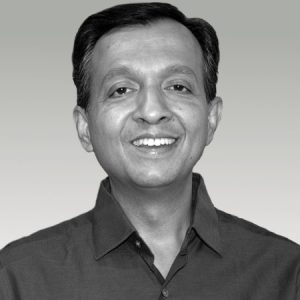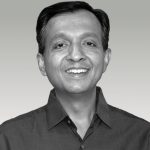
Chandramouli Venkatesan
Guest is known for...
Chandramouli Venkatesan has a corporate track record of over 25 years, including working with Cadbury’s and now as CEO of Special Projects with Pidilite Industries. He authored the book “Catalyst” on leadership, reflecting on how leaders should approach growth and direction in their journeys.
Here's what I will learn...
In the podcast, Chandramouli Venkatesan shares insights on personal growth and leadership, discussing the TMRR model, learning cycles, and sowing seeds for the second half of life. He also talks about separating quitting from joining decisions, balancing life and work, and the importance of values in leadership.
LISTEN TO THE FULL CONVERSATION
From the Podcast
Mouli talks about the context behind writing the book which is a combination of him finding time across multiple flights to Singapore to pen down his thoughts given a Regional role and a desire to take a break and take stock of life. He also discusses how he wanted to contribute to social impact in a way that leverages his skills rather than do on-ground field work where he may not have any distinctive value to add.
Mouli talks the fact that the time people put in a job is not an appropriate indication of the experience they have gained. He outlines TMRR (Target, Measure, Review and Reflect) as a process through which people could derive a lot more experience than what the average person might get in that time period. He also talks about how people can build in the habit so that they practice it on a regular basis.
Mouli talks about the concept of Learning Cycles and how it is critical for people to focus on completing large learning cycles to build significant distinctive capability. He also makes the distinction between major and minor learning cycles and talks about how effective leaders often kick their game up a notch when it comes to a major learning cycle. The concept of learning cycle is also relevant when we think about processing opportunities that come along in our journey.
Mouli discusses that a lot of the wins in the first half of the career are often on the back of low hanging fruit but the wins in the second half are often harder. He mentions that apart from solving for successes in the first half, we should all build the muscle and resilience to be able to go after the complex win or the high hanging fruit. And that sometimes might require us to go slow and learn than run fast and miss out on building this muscle.
Mouli underscores the criticality of having sound mentors in today’s world where there are more forks in the road and several choices to be made for all of us. Mouli also talks about his framework for how we all should think about selecting the mentors that guide us. He talks about how Mentors should have seen some parts of the “movie” that you haven’t and should be completely vested in your success with no conflict of interest.
Mouli talks about how people often mix up the two decisions and how they can end up over-appreciating what is right in the new context and what is wrong in the current situation. He brings it back to the point that careers are driven by capability and not by role/title. He urges us to think hard about the learning opportunity in the current environment and carefully evaluate the pros and cons of the current and the new opportunity before taking a decision.
Mouli talks about how the early years were often focused on achievement, which later gave way to an orientation towards Mastery and the last phase being driven by purpose. He talks about how he found his purpose along his journey and how it has impacted the choices he makes in everything he does whether it is a market visit or writing a book.
People often talk about Work-Life Balance and the rhetoric is often around “Life” being the residual figure after work has consumed you. Mouli flips this argument around and says that there is a lot to be gained on the work front by organizing your “life” carefully. He talks about passionate striving hobbies that push you towards excellence at work and also talks about how some of the social impact initiatives he pursues enhances his empathy when he is at work.
Mouli talks about the notion of Values as something that has a significant upside over the long run and challenges the current narrative which is often around showcasing the downside of people who display poor values and are punished. He also talks about the need for us to have an absolute view of this versus a relative view.
Mouli talks about how he has made some of his early career moves based on the notion of fit. He also acknowledges that there is often an information asymmetry here and uses surrogate sources (profiles of others who have gone there and succeeded) of data as a means of determining if he would belong. He also emphasizes the criticality of focusing on learning rather than earning to drive professional growth over the long-term.
